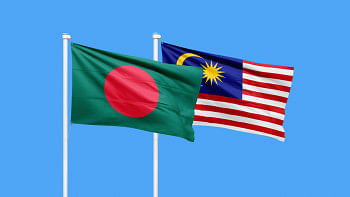The Tale of Two Oath Takings
The election results of Assam and West Bengal generated two distinctive responses in Bangladesh. While the oath-taking ceremony of Sarbananda Sonowal led by the BJP government generated some apprehensions in Bangladesh regarding the muscular BJP policy towards the sensitive issue of illegal immigration and the likely repercussion on bilateral relations, Mamata's re-election in West Bengal generated hope and happiness in Bangladesh and gave rise to optimism for a solution of the long-standing issue of Teesta water sharing. Mamata Banerjee had also extended an invitation to Prime Minister Sheikh Hasina to attend her swearing-in ceremony. Senior leader Amir Hossain Amu, however, attended the ceremony on Hasina's behalf as she is currently visiting Japan. Such warmth would bore well for the bilateral relations between the two countries, the foundation of which was laid when Mamata Banerjee visited Bangladesh for the first time after becoming the Chief Minister in 2015 to attend the Amar Ekushey commemoration, where she was given a red carpet welcome.
Of course, there is historical linguistic and cultural affinity between West Bengal and Bangladesh, while Assam occupies a different space historically in popular imagination. Radcliff's exclusion of Assam from East Bengal forced Jinnah to accept moth-eaten Pakistan. Post-1947, the assertion of the Assamese identity set them against the Bengalis, ultimately resulting in Assamese agitation and resultant communal violence. However, the issue of immigration is far from settled in spite of the Assam Accord, and has always remained a domineering election issue in the state.
Let us look at the manifesto of the BJP. If voted to power, it promised to "complete sealing of the Indo-Bangladesh border in the state" in cooperation with the central government, and take stern action against factories and industries employing "infiltrators" in the Assam vision 2016-25 document. It also planned to construct model villages with the help of the Border Security Force (BSF) and ex-servicemen to assist the police and other security forces towards prevention of 'infiltration' along the border to foil any immigration bid that often takes the help of kin groups. It promised to establish border police to closely cooperate with BSF for better guarding of the border.
The issue of immigration is not a new agenda in Assamese politics. There exist genuine apprehensions and anti-immigration slogans find popular resonance. BJP only capitalised on this issue and was helped by the anti-incumbency factor that afflicted Congress. It is true that over time Assam was not successful in identifying the illegal immigrants, as many of them have been provided with or have acquired election identity cards, thanks to vote bank politics. Moreover, the IMDT Act, which was invalidated by the Supreme Court since it contravenes Article 355 of the Constitution and has been the main impediment in identification and deportation of illegal immigrants, did not help the matter either. However, it remains to be seen how the BJP government is going to deal with the complex issue of illegal migration. It is not possible to 'seal off' the porous border. The BJP also used the same rhetoric during the 2014 parliamentary election. However, after two years of being in power, it did not take up this issue with Bangladesh, reflecting the politics of immigration.
In West Bengal, the Trinamool Congress presented itself as a unifying force of bringing together 'Ram and Rahim', and promised to make Bengal free from communal violence. Taking a cue from the Burdwan blasts and the controversial role of state police, the BJP accused that during the TMC regime, bomb-making industries have flourished in Bengal and the sound of blasts has 'suppressed Rabindra Sangeet'. In 2014, speaking in Sreerampur, Modi had accused the state government of providing citizenship to immigrants from Bangladesh while asking them to pack their bags before the election results were declared, as BJP would not allow them to stay. Interestingly, while addressing election rallies both in West Bengal and Assam, Modi avoided any reference to Bangladesh.
The question is how will Modi balance the expectation that the BJP government has generated without adverse impacts on Bangladesh. It needs to be emphasised that India at present shares excellent relations with Bangladesh. Unlike the previous BNP regime, it received utmost cooperation from the current government in addressing the issue of insurgents sheltered in Bangladesh, which has helped the Indian government to initiate peace talks. There is also significant cooperation in addressing militant networks that spread across the border through intelligence cooperation and joint investigation, especially in the context of the Burdwan blast. It is likely that the Modi government will not do anything that would affect this bilateral synergy. Thus, the question is how to address the vexed issue beyond rhetoric.
Determining the quantum of illegal immigration would be an uphill task. The question is how to determine who has 'doubtful citizenship', to use BJP's description, in Assam. Psephologists have often referred to the unusual population growth in the border districts of Assam, which registered growth that is many times higher than the all India level. Narratives in Assam are bolstered by such statistics, raising the anxiety that the Assamese would soon be a minority in their own province. While border fencing is a reality and the two governments have introduced comprehensive border patrol mechanism, the problem has been the part of the border that is riverine. There is historic cross border dependence that fuels various illegal activities, given the fact that some of these people live in the margins of the economy away from the focus of nation states. Illegal activities and illegal migration, including trafficking, would need a comprehensive approach.
While deporting those who have acquired all the necessary documents to prove their citizenship would be difficult, it would also be impossible without a bilateral understanding with Bangladesh. The 1993 Agreement between India and Bangladesh only deals with people who are caught by the security forces while crossing the border. 'Pushbacks' are not a long-term viable option. As many have argued before, a work permit system for those who want to work in India is the need of the hour. Rather than being prejudiced or taking a political position by denying immigration to India, Bangladesh should also come forward to see how best this issue can be resolved, taking the interest of two nations into consideration. For this India, in consultation with Bangladesh, needs to work out a system which allows the workers to work and remit their money through legal channels and ensure that they are not being exploited.
Perhaps this framework now needs to be given serious thought to balance the apprehension that the BJP government in Assam generates with the great hope that didi's re-election holds. Modi's government relies on Mamata Banerjee to take the bilateral relations forward with Bangladesh, especially at a time when the government policies toward Pakistan and Nepal are not at its best. While Assam's issue of illegal immigration needs a practical solution, it is unlikely that Prime Minister Modi will allow it to overshadow the country's excellent bilateral relations with Bangladesh, especially at a time when didi appears to be on board.
The writer is Research Fellow, IDSA.

 For all latest news, follow The Daily Star's Google News channel.
For all latest news, follow The Daily Star's Google News channel. 








Comments